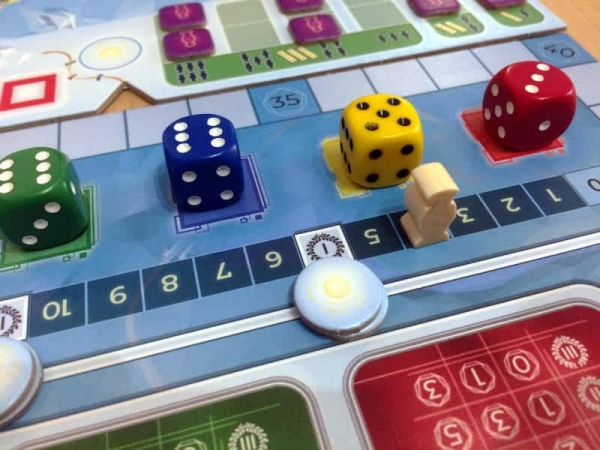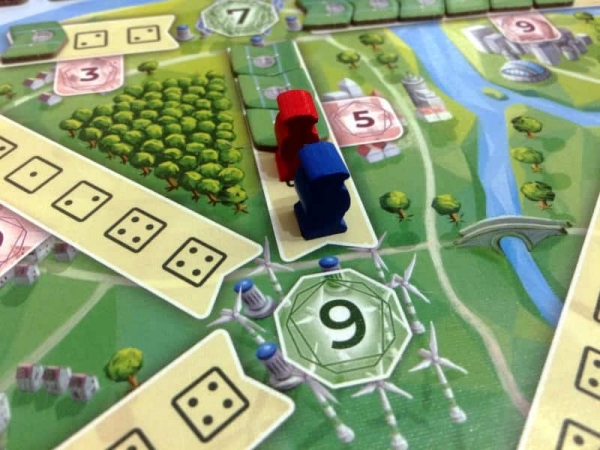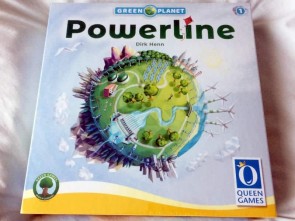You have been tasked with building the sustainable energy network of the future. Your goal is to connect wind farms, hydro-energy plants and other green power sources to each other, as well as different cities. You have to decide which part of the network needs attention first and what can wait until later. Take care though and make sure you don't spread your workforce too thinly, but also avoid putting all of your light bulbs into one circuit. You want to end up making the best use of each and every Powerline by Dirk Henn from Queen Games.
Green Credentials
Let me say straight away that the theme of Powerline is even thinner than the veneer on my kitchen cupboards - and their cherry wood coating readily peels off with even the smallest splash of water. So whether you're building powerlines and whether these powerlines are connecting sustainable power sources to each other and to cities is neither here nor there. It really doesn't come through as you play. The only reason that you know that that's what the game is about is because of the rulebook and the illustrations.
However, it would be unfair to say that Powerline isn't a green game, because the physical game comes with green credentials. Queen Games say that they have always been an environmentally conscious company. Powerline is the first in their "Green Planet" series of games and is followed by Future Energy, on Kickstarter at the time of writing. Their new game series tries to strengthen Queen Games' commitment to minimising the carbon footprint of the games they release. The publisher has been working with local manufacturers on component procurement to reduce the distance items need to be shipped. They have also been planting trees to try and make Powerline's production carbon neutral.
It's great to see another publisher trying to make our hobby a little bit greener and more sustainable. I think Queen Games should be congratulated here. Us hobby gamers should encourage this behaviour in more publishers. So even though the theme of green energy and environmental friendliness doesn't really come through in the gameplay, the game itself certainly fits the setting.
Abstract Roll-and-Tile-Placement
So, Powerline is really more of an abstract roll-and-write and that's fine. Mind you, there is no writing. Instead of filling in spaces on a notepad, you place little tiles onto your player board. Everyone starts with a different board, which is randomly dealt out but has the same scoring potential. Then, in every round six dice are rolled and each one has a different colour. The dice are placed in a specific colour order: red, yellow, blue, green, white and black. That order is important and creates two number sequences. You can either start with red and work your way to black or you start with black and work backwards to red.
 Four of the coloured dice in Powerline, green, blue, yellow and red
Four of the coloured dice in Powerline, green, blue, yellow and red
However, instead of every player having to set their dice to the same pip values, you place workers of the same colours on your board. That's really neat and resolves one of the issues some roll-and-writes have. There is no fight over the dice. The results are visible to everyone in the centre of the table and you can take your time moving your workers around on your board until you're happy with their placement. Everyone just has to obey the colour order of the dice and assign their workers in that order to their player board.
If you haven't guessed it, player boards represent a map with power stations in different locations, each connected to at least one other power station via a sequence of pip values. These are the powerlines you're trying to build. Halfway along every powerline is a city. So you need to fill in the pip values with the dice results. Once you have completed a powerline, you score points for a city and once a power station has all its powerlines connected up, you score points for it as well.
Almost Meditative
To start with, you have no problem placing all your workers. You can't ever work on more than three powerlines in a single turn, but you can have more powerlines in progress throughout the game overall. As the game progresses, things get trickier. The thing is, you can only ever place different numbers of workers a certain amount of times. For example, in the base version of the game, you can place all six workers only twice during the whole game. Once you have done that, you can never place all six workers again.
That creates an interesting gameplay dynamic. Someone could forge ahead and place all six workers in rounds one and two and then five workers in rounds three and four. The problem is, now they can only place up to four workers. Their productivity automatically slows down and allows other players to catch up. It also creates a conundrum, because you might want to save the option to place six workers towards the end of the game, but you can't be sure if the dice rolls will be in your favour. You really have to gamble a little and hope for the best.
Once you have played a few rounds, the game becomes rather meditative. Powerline is certainly a multiplayer-solitaire game, where everyone takes their turn in their own time and on their own board. There is no way to interfere with other players in any way. Everyone just does their own thing and that's why it can allow you to get into your zone and just focus your mind on the game. It also explains why this game can be played solo or with up to six players. It really doesn't matter how many there are of you. The game length doesn't change one bit.
 A close-up of the player boards with the powerlines and their pip values, as well as the differently coloured workers that represent the dice
A close-up of the player boards with the powerlines and their pip values, as well as the differently coloured workers that represent the dice
A Calm Breeze
I think Powerline is actually a lot of fun. The randomness of the dice roll and the ability to take your time to find the best spots for your workers on your player boards mean this game is like a calm breeze. It might not be enough to turn the blades of a wind turbine, but it's enough to get the synapses in your brain to discharge happily. It's also a game that's pretty easy to explain and I love that it's so very tactile. I think that's one of my issues with roll-and-writes. Placing your little wooden workers and afterwards little cardboard tokens onto your player board to indicate your progress on your powerlines feels very satisfying.
Given that you're not writing anything also means that you can replay this game as often as you like, without having to photocopy sheets or print out new ones. There is no paper or ink wasted, which adds to the game's green credentials.
So, if you want a multiplayer-solitaire game that takes less than an hour to play and that you can learn as you play, then Powerline is a great option. You never know, it might even become an evergreen.
 Games
Games How to resolve AdBlock issue?
How to resolve AdBlock issue? 
















